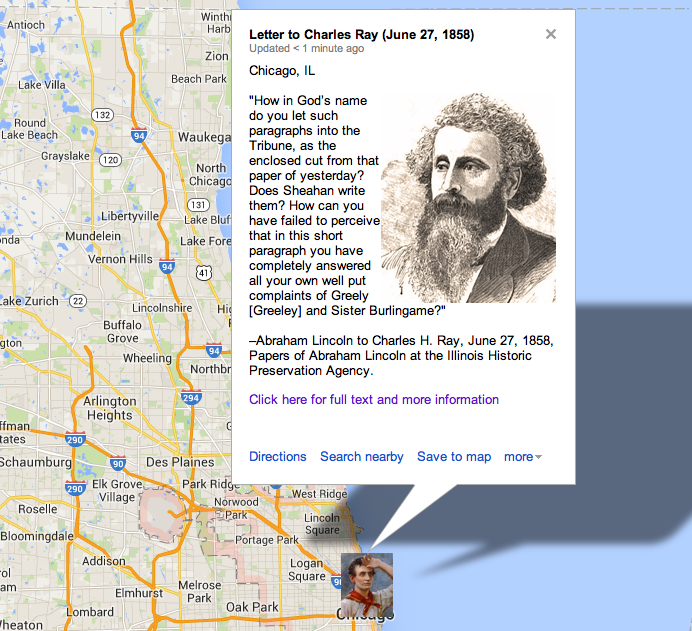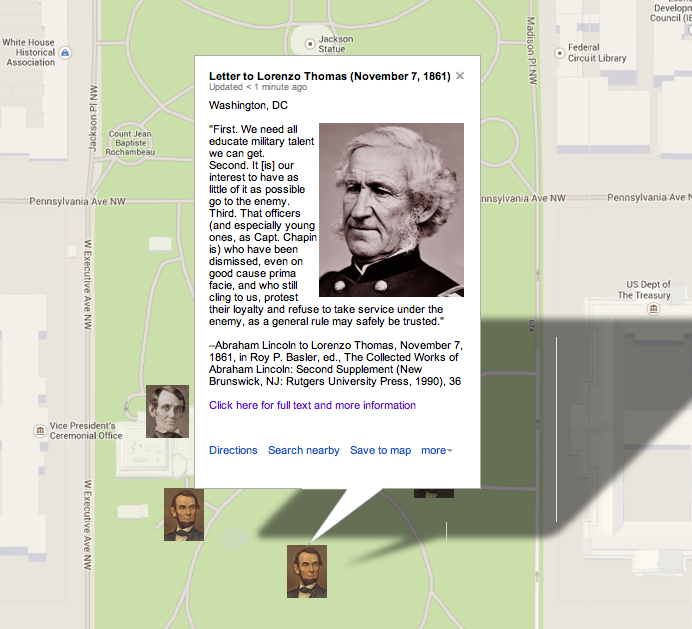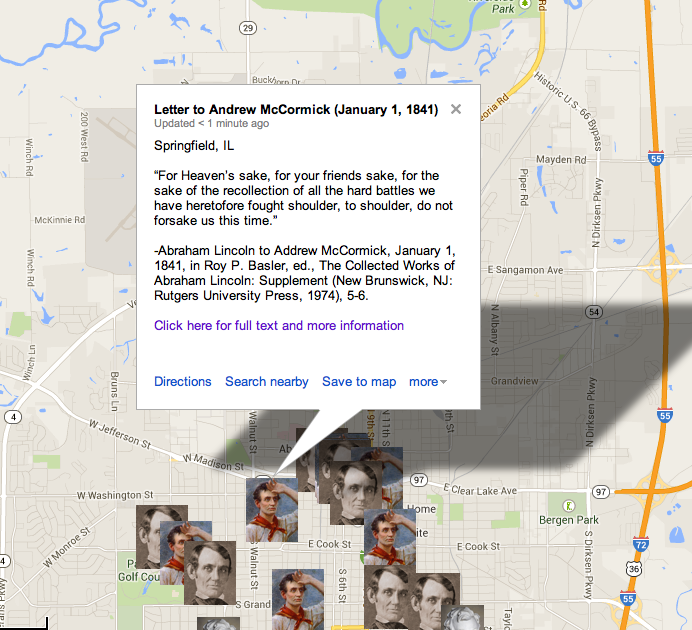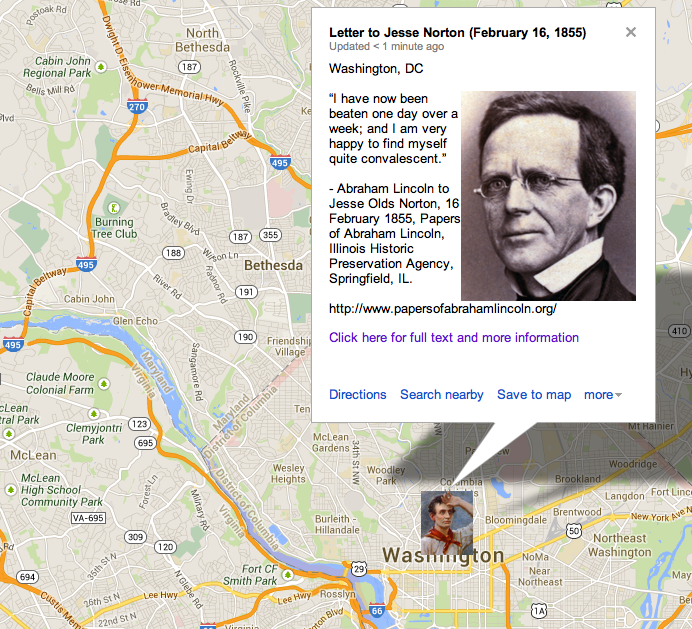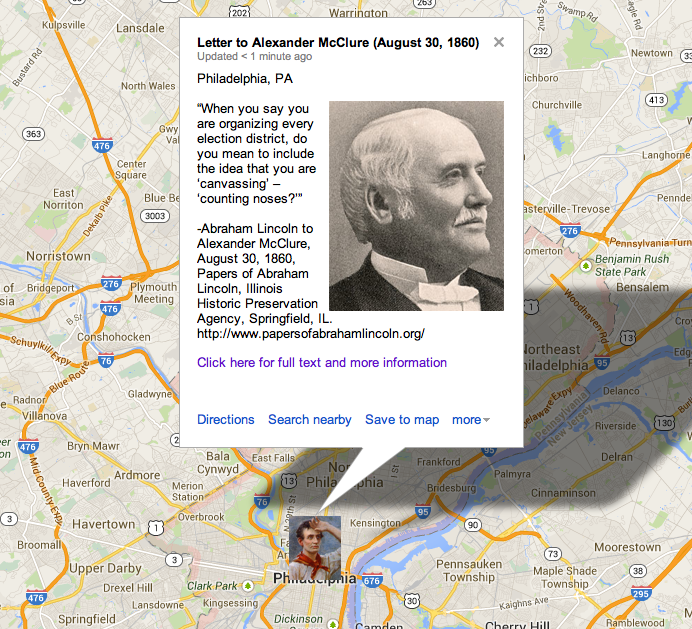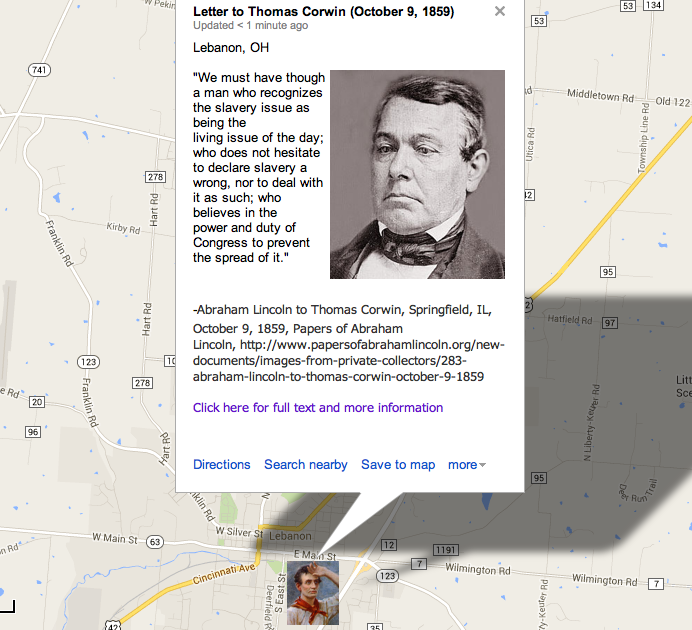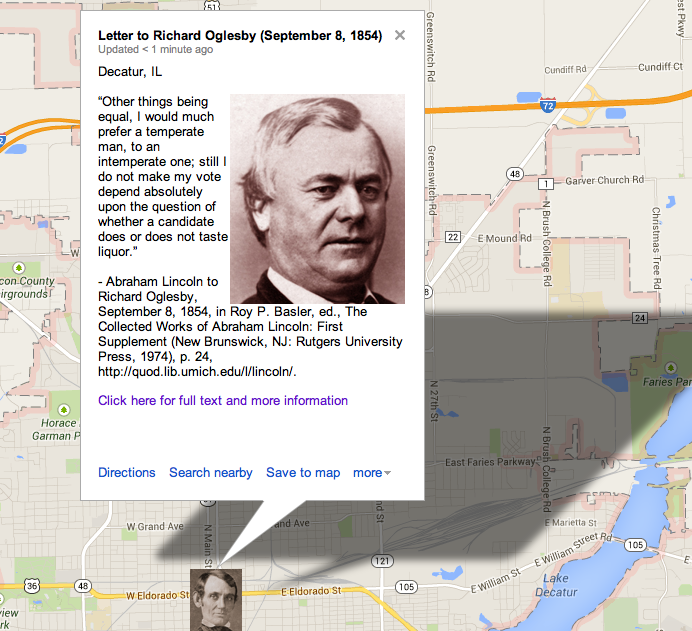Ranking
#135 on the list of 150 Most Teachable Lincoln Documents
Annotated Transcript
“I had supposed that it was not proper for me, residing in Illinois, to occupy the time of the Convention in making a speech. I will, however, avail myself of the few minutes allowed me until the return of the committee on resolutions, as no one else, perhaps, is desirous to do so.”
On This Date
HD Daily Report, July 6, 1847
The Lincoln Log, July 6, 1847
Custom Map
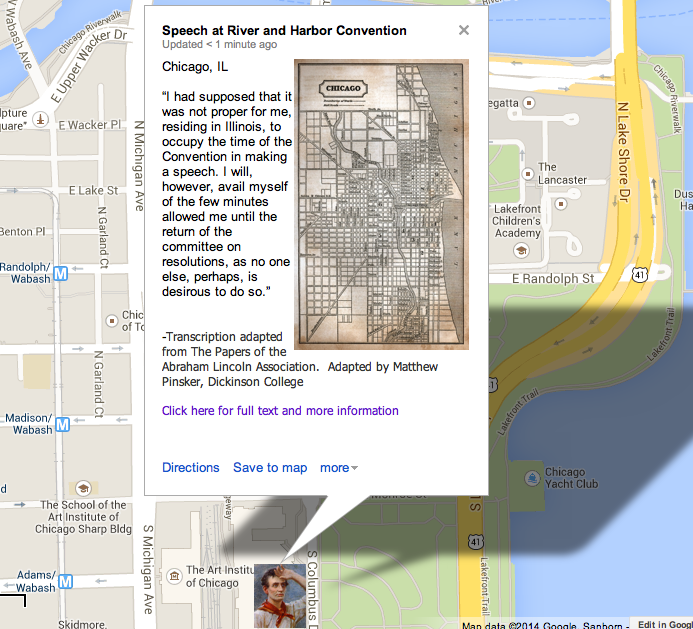
View in Larger Map
How Historians Intepret
“At the convention, a New York Democrat, David Dudley Field, gave an “able and courteous” speech favoring a strict construction of the Constitution and supporting only limited river and harbor improvements. Horace Greeley wrote that Lincoln responded “briefly and happily” to Field.368 When he rose amid vigorous applause to speak, a Pennsylvanian asked who he was. “Oh,” came the reply, “that is Abe Lincoln of Springfield, the ablest and wittiest stump speaker on the Whig side in the State of Illinois.” His appearance was less impressive than his oratory. As one delegate recalled, the “angular and awkward” Lincoln wore “a short-waited, thin swallow-tail coat, a short vest of same material, thins pantaloons, scarcely coming down to his ankles, a straw hat and a pair of brogans with woolen socks.” Some Whigs, not sympathizing with Field’s argument, had tried to silence him with shouts of derision. Ever the peacemaker, Lincoln urged the delegates to consider themselves “a band of brothers” and not interrupt each other: “I hope there will be no more interruption – no hisses – no jibes.” Responding to Field’s remarks, Lincoln respectfully pointed out that the New Yorker had ignored a central issue: “Who is to decide differences of opinion on constitutional questions? What tribunal? How shall we make it out? The gentleman from Pennsylvania (the Hon. Andrew Stewart) says Congress must decide. If Congress has not the power, who has? Is it not, at least, for Congress to remedy the objection [the Constitution did not authorize Congress to appropriate funds for internal improvements], and settle this great question. If there is any other tribunal, where is it to be found? My friend from Pennsylvania, Mr. Benton and myself, are much alike on that subject.” Lincoln ignored the landmark Supreme Court ruling in Marbury vs. Madison that the Court itself was the ultimate arbiter of constitutional disputes. A decade later he would at much greater length question the Court’s power to declare acts of Congress unconstitutional.”
—Michael Burlingame, Abraham Lincoln: A Life (2 volumes, originally published by Johns Hopkins University Press, 2008) Unedited Manuscript By Chapter, Lincoln Studies Center, Volume 1, Chapter 7 (PDF), pp. 726-727.
“On the morning of July 6, 1847, David Dudley Field, prominent New York lawyer, spoke in defense of the position of the Polk administration. He rejected the obligation of the federal government to help develop the navigation of the Illinois River, which traversed a solitary state. Lincoln stood to offer a reply, speaking for the first time before a national audience. His full remarks were not recorded, but Field’s remarks brought out the best of Lincoln’s satire. Lincoln, who as usual had done his homework, learned that Field favored a federal appropriation for the Hudson River in New York. Lincoln asked “how many States the lordly Hudson ran through.” Lincoln’s remarks made an incredible impression on a leading New York newspaper editor. Horace Greely, a reformer and politician at heart, and founding editor of the New York Tribune, always had a nose for the up-and-coming. He thought he spied it in the tall congressman-elect. The next day, Greely wrote in appreciation, ‘Hon. Abraham Lincoln, a tall specimen of and Illinoian, just elected to Congress from the only Whig District in the state, spoke briefly and happily in reply to Mr. Field.’”
—Ronald C. White, A Lincoln: A Biography (New York: Random House Publishing Group, 2009), 136.
NOTE TO READERS
This page is under construction and will be developed further by students in the new “Understanding Lincoln” online course sponsored by the House Divided Project at Dickinson College and the Gilder Lehrman Institute of American History. To find out more about the course and to see some of our videotaped class sessions, including virtual field trips to Ford’s Theatre and Gettysburg, please visit our Livestream page at http://new.livestream.com/gilderlehrman/lincoln
Searchable Text
Mr. Lincoln, member of Congress from Illinois, being called upon, addressed the Convention, in substance, as follows:
GENTLEMEN: I had supposed that it was not proper for me, residing in Illinois, to occupy the time of the Convention in making a speech. I will, however, avail myself of the few minutes allowed me until the return of the committee on resolutions, as no one else, perhaps, is desirous to do so.
I desire, for the sake of harmony, to make a few remarks –not of division and discord, but of harmony. We meet here to promote and advance the cause of internal improvement. Parties have differed on that subject, but we meet here to break down that difference –to unite, like a band of brothers, for the welfare of the common country. In harmony and good feeling, let us transact the business for which we have assembled and let no firebrands be cast amongst us to produce discord and dissensions, but let us meet each other in the spirit of conciliation and good feeling. The gentleman from New York made such a speech as he believed to be right. He expressed the sentiments he believed to be correct, and however much others may differ from him in those views, he has a right to be heard, and should not be interrupted.
If it was the object of this Convention to get up a grand hurrah, a few of its members are pursuing the proper course to effect that object. But such was not the purpose of this Convention. In the course of debate, it is impossible to speak without alluding, in some manner, to constitutional questions. In all speeches, on every occasion, there are remarks to the point and collateral remarks. Let us avoid collateral remarks in this Convention, as far as possible. Democrats do not wish to do any thing in this Convention that will conflict with their past course, and if questions should come up which they do not approve, they should be permitted to protest against them. I hope there will be no more interruption –no hisses –no jibes. I pledge myself that the delegates from Illinois will keep quiet.
The argument of the gentleman from New York upon the constitutionality of the power to make appropriations should be examined. I do not feel that I can do it –time will not permit—but some one more able, more competent to do the subject justice, will reply. All agree that something in the way of internal improvement must be done. The difficulty is to discriminate, when to begin and where to stop. There is great danger in going too far. Members of Congress will be influenced by sectional interests and sectional feelings. I have not taken the pains to write out my opinions upon the construction to be put upon the constitution. Any construction, that there is something to be done for the general good and no power to do it, would be wrong. I do not go for sectional improvements through all are more or less sectional. Is there any way to make improvements, except some persons are benefitted more than others? No improvement can be made that will benefit all alike. A pertinent question was asked the gentleman from New York, to which he did not reply: Who is to decide differences of opinion on constitutional questions? What tribunal? How shall we make it out? The gentleman from Pennsylvania, the Hon. Andrew Stewart, says Congress must decide. If Congress has not the power, who has? Is it not, at least, for Congress to remedy the objection, and settle this great question? If there is any other tribunal, where is it to be found? My friend from Pennsylvania, Mr. Benton and myself, are much alike on that subject.
I come now, to the subject of abstractions. The gentleman from New York (Mr. David Dudley Field) made a slight mistake, when he said that the Revolutionary war was caused by abstractions. They denied Parliament the right to tax them without representation. This is not a parallel case, but totally different. The abstractions of the present day are not the abstractions of the Revolution.
I have the highest respect for the gentleman from New York. In his speech, he made a beautiful appeal in behalf of the Constitution. He implores us, by all considerations, to foster and protect it. He loves the Constitution. I hope I may love it as well as he does, but in a different way. He looks upon it as a new work, which may be sifted the seeds of discord and dissension. I look upon it as a complete protection to the Union. He loves it in his way; I, in mine. There are many here who entertain the same views which I do, who will, I doubt not, sustain me, and with these remarks I beg leave to close.

